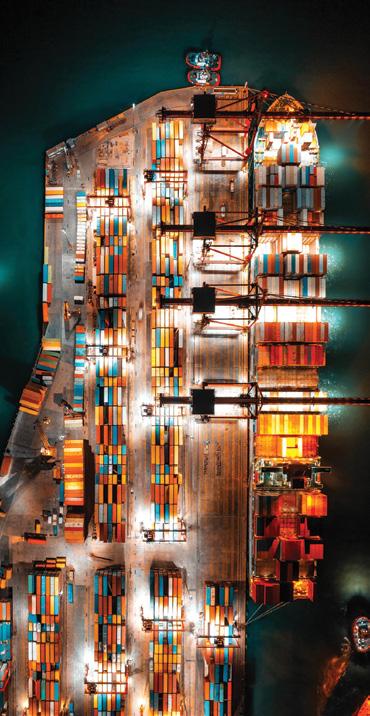
4 minute read
AFRICAN BUSINESSES SHOULD DIVERSIFY SUPPLY CHAINS TO MITIGATE THE GLOBAL LOGISTICS CRUNCH
Philip Myburh, Head of Trade and Africa-China, Business and Commercial Clients, Standard Bank, comments on turmoil in trade and logistics, a situation only made worse by Russia’s invasion of Ukraine.
TThe world of international trade is dealing with a perfect storm of challenges on multiple fronts. This is having adverse consequences for global supply chains, many of which rely on exports to and imports from China – where much of the friction is emanating from
With the rollout of global vaccination programmes continuing at a healthy pace, there has been cautious optimism that economic activity will continue to recover and return to a semblance of normality. However, as it stands, the trade ecosystem is anywhere but in a normal state of operation and in no shape to meet the uptick in demand for goods and supplies.
The Covid-19 pandemic had wide-reaching impact on international trade, disrupting long-established trade and travel routes while significantly shifting levels of supply and demand.
One of the key drivers of the misallocation of trade is the fact that when consumers were home-bound, spending on services was replaced by increased spending on goods. This was exacerbated by increased spending power from stimulus programmes in places like the United States. Unfortunately, logistics service providers didn’t anticipate the extent of this demand impact on supply chains, which placed pressure on a system that is still trying to play catch up.
Additionally, supply chains continue to be disrupted by port closures, limited air freight capacity and factory shutdowns or restrictions, particularly on the China side. If any trace of Covid-19 is detected on a product, China will close the associated line down until it is deemed safe again (this could be for months at a time). Ships coming into that line might already be halfway there and are then forced to divert from their typical lines to other locations or countries to offload stock.
It has taken China multiple decades to get to an efficient, optimal flow of its shipping vessels and lines. It is an intricate system that determines which goods, container sizes and types of ships are used on which line. If that system is shut down. overnight and certain parts are activated sporadically, it results in inefficiencies with containers stuck in certain parts of the world because the system is out of kilter. This leads to a critical shortage of containers and causing shipping costs to skyrocket. Ultimately, it is the end consumer that will bear the brunt of increased costs.

While China is very much committed to enhancing relations and trade with African economies, it is focusing its energy on unlocking trade blockages on more profitable trade routes such as those with developed economies like the United States, Europe and Southeast Asia.
African Impact
Unfortunately for the African continent, whose largest trade partner is China, this is having a significant impact. The continent is a net importer and relies heavily on imports from China. Without shipping vessels coming through to African harbours with containers to offload, it creates a multiplier effect as there is then a lack of containers to export goods out of the continent. While a significant percentage of global trade also happens in aviation, very few planes flew in and out of Africa during the various lockdowns, including the China corridor, which means the continent lost and is losing further capacity to send and receive goods.
China has also instituted additional measures on importing goods from the rest of the world. For example, it has a differentiated policy with regards to frozen goods compared with other countries. Its departure point is that Covid-19 can be transmitted on frozen goods. So, for a business looking to export frozen seafood to China, it suddenly takes longer, costs more and becomes a more rigorous process as the product must go through Covid-19 checks at Chinese points of entry.
All these factors have left African businesses, who are feeling the brunt of shortages in stock and an increased cost of logistics, in a tight spot. With significant uncertainty over the short to medium term, the diversification of supply chains is therefore critical for businesses to weather challenges in the short term and to reduce reliance on a specific environment, geography or supplier. The more you can diversify, the better.
There are expectations that Africa’s trade challenges with China will resolve in the short term and China will undoubtedly remain a key supplier and trade partner to Africa. It is also important to remember that China is an exceptionally large country. By way of example, there are cities in China that are as far from each other as Johannesburg from Nairobi, so if there is a challenge or a Covid-19 outbreak in one area it still leaves multiple alternatives still within the country.
But there is also an opportunity to look for trade partners, suppliers or clients on the continent itself. Of course, Africa’s evident limitations in certain sectors and logistics capabilities hamper optionality. However, the African Continental Free Trade Area (AfCFTA) is aggressively driving opportunities among African countries and working to resolve challenges hindering inter-Africa trade.
Solutions Available
With solutions such as Trade Club and our Africa China Trade solutions, Standard Bank is playing a key role in supporting businesses with all elements of trade including access to relevant information, connecting them to reputable suppliers and buyers.
Standard Bank also advises its clients on appropriate insurance solutions to help mitigate associated risks, with various financial solutions available that help to de-risk certain elements of the trade process.
Lastly, Standard Bank’s Trade Suite takes full ownership of our clients’ logistics needs so that all the challenges experienced throughout the process are managed by us on behalf of the customer.
In times of uncertainty, businesses want to make sure that they have the right partnerships. With Standard Bank’s diverse footprint, experience and solutions, it is the financial services partner to help businesses navigate these stormy seas whether the aim is to grow or fortify their businesses (or both)

The continent is a net importer and relies heavily on imports from China. Without shipping vessels coming through to African harbours with containers to offload, it creates a multiplier effect as there is then a lack of containers to export goods out of the continent.










